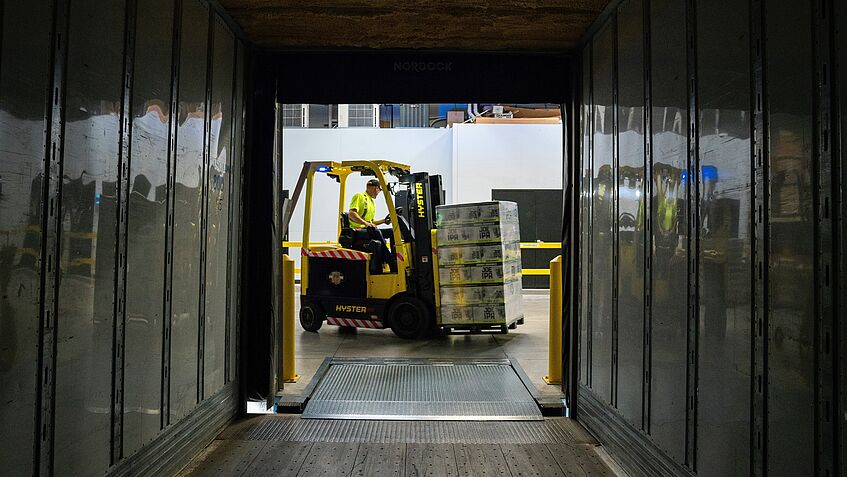Project Archive Overview
The following projects have been completed in this group. Details can be found in the publications listed below.
(Shared) Mobility Systems
- P. Vogel, J. F. Ehmke, D. C. Mattfeld (2017): Decision Support for Service Network Design of Bike Sharing Systems, accepted for publication in: Computational Logistics, LNCS, Springer.
- V. Schmid, J. F. Ehmke (2015): Integrated timetabling and vehicle scheduling with balanced departure times. OR Spectrum, 37(4):903-928, doi 10.1007/s00291-015-0398-7.
Sustainable Routing
- T. Bektas, J. F. Ehmke, H. N. Psaraftis, J. Puchinger (2018): The Role of Operational Research in Green Freight Transportation. European Journal of Operational Research, doi:10.1016/j.ejor.2018.06.001.
- J. F. Ehmke, A. M. Campbell, B. W. Thomas (2016): Vehicle Routing to Minimize Time-Dependent Emissions in Urban Areas. European Journal of Operational Research, 251(2):478-494, doi:10.1016/j.ejor.2015.11.034.
- J. F. Ehmke, A. M. Campbell, B. W. Thomas (2016): Data-Driven Approachs for Emissions-Minimized Paths in Urban Areas. Computers & Operations Research, 67:34-47, doi:10.1016/j.cor.2015.08.013.
Reliable Routing
- J. F. Ehmke, A. M. Campbell, T. Urban (2015): Ensuring Service Levels in Routing Problems with Time Windows and Stochastic Travel Times. European Journal of Operational Research, 240(2):539-550, doi 10.1016/j.ejor.2014.06.045.
- J. F. Ehmke, A. M. Campbell (2014): Customer Acceptance Mechanisms for Attended Home Deliveries in Metropolitan Areas. European Journal of Operational Research, 233(1):193-207, doi 10.1016/j.ejor.2013.08.028.
Service Analytics
- C. Cleophas, J. F. Ehmke (2014): When are deliveries profitable? Considering order value and transport capacity in demand fulfillment for last-mile deliveries in metropolitan areas. BISE Business & Information Systems Engineering, 3:153-163, doi 10.1007/s12599-014-0321-9. This paper has also appeared in German language: Wann sind Lieferaufträge profitabel? Berücksichtigung des Auftragswertes und der Transportkapazität in der Tourenplanung für die "letzte Meile" in Ballungsräumen. Wirtschaftsinformatik, 3:173-184, doi 10.1007/s11576-014-0412-8
- A. Winter, R. Alt, J. F. Ehmke, R. Haux, W. Ludwig, D. Mattfeld, A. Oberweis, B. Paech (2012): Manifest Kundeninduzierte Orchestrierung komplexer Dienstleistungen. Informatik Spektrum, 35(6):399-408.
Anticipative Management of Dynamic Transportation Services

Anticipative Management of Dynamic Transportation Services
• Investigated by: Jarmo Haferkamp, Marlin Ulmer, Jan Fabian Ehmke
Dynamic ride-sharing services operate large fleets of vehicles to fulfill incoming trip requests on demand. Due to the short-term nature of requests, relocation of idle vehicles is crucial for their success. The objective for relocation policies is to offset unbalanced distributed trip origins and destinations to avoid demand surpluses, i.e. the rejection of requests. Along with potential demand surpluses, relocation decisions have to consider further decision criteria such as travel distances or other relocations. Our aim is to learn – on a tactical level – how to weight these decision criteria, while at the operational level deciding on the exploitation of myopic or anticipatory information to achieve a balanced and robust ride-sharing system.
Integrated Routing and Packing

Integrated Routing and Packing
• Investigated by: Corinna Krebs, Jan Fabian Ehmke
Given automated order systems, detailed characteristics of items and vehicles enable the detailed planning of deliveries including more efficient and safer loading of distribution vehicles. Many vehicle routing approaches ignore the corresponding complex loading constraints. We focus on the comprehensive evaluation of loading constraints in the context of combined Capacitated Vehicle Routing Problem and 3D Loading (3L-CVRP) and its extension with time windows (3L-VRPTW).
Recent publications
• Axle Weights in combined Vehicle Routing and Container Loading Problems
Machine-Learning Based Estimation of Fuel Consumption in Green Logistics

Machine-Learning Based Estimation of Fuel Consumption in Green Logistics
• Investigated by: Johann Hillmann, Jan Fabian Ehmke
As of now, the transport of goods via on-road vehicles contributes a significant share to the overall emissions of CO2 in the EU. Accordingly, significant efforts have been undertaken in recent years to incorporate detailed emissions models into traffic optimization objective functions, such as vehicle routing problems. The quality of available emissions models with regard to estimating emissions precisely and planning environmentally-friendly routes, often prove to be too imprecise and static for the task, creating a need for new, enhanced models. We follow a data-driven approach and develop a more precise, robust, and generalizable emissions model by incorporating publicly available fleet-based fuel consumption data together with machine-learning techniques. This information is not only relevant for planning of logistics service providers, but also for environmentally conscious customers. Because of that, the ability to plan deliveries sustainably and transparently may provide an important service element to companies to secure competitiveness. How sustainable delivery options are best communicated to the customer and whether this improves the efficiency of planning will also be explored in this project.
Potentials of Automated Transport Systems

Potentials of Automated Transport Systems
• Investigated by: Rico Kötschau, Jarmo Haferkamp, Jan Fabian Ehmke
The technical progress on self-driving and connected vehicles is expected to lead to a significant change in the realization and organization of passenger and freight transportation. Aims of the project are: (1) to derive requirements for self-driving vehicles, (2) to estimate and evaluate their impact on transportation systems as well as environment and safety, (3) and to develop visions of future behavioral and organizational forms caused by self-driving vehicles.
A key aspect in achieving these aims is the development and investigation of solution approaches for the strategic and operational planning problems of self-driving and connected car based services.
Recent publications
• Combining Simulation and Optimisation to Design Reliable Transportation Services with Autonomous Fleets
• Effectiveness of demand and fulfillment control in dynamic fleet management of ride-sharing systems
